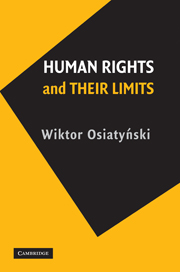5 - Human Rights and Other Values
Published online by Cambridge University Press: 05 June 2012
Summary
In the past several decades, the language of rights has become extremely popular, with rights at last being recognized as inherent attributes of every human being. Previously, the ability to claim had been a privilege rather than a right. The universality of rights was, at best, a postulate, with their inherent character justifying the proposition that the rights of every person deserve to be respected. But throughout history and across diverse regions of the contemporary world, the majority of people have been deprived of their most basic rights. To claim anything, one had to have power – either sheer physical power (such as that power exercised by a male head of a family over his wife or wives and children); political power (ultimately upheld by the physical power of the sword or another means of coercion); economic power (which elicits favorable responses to demands by an employer or an owner among dependent people); market power (including the use of advertisement or propaganda to influence people's choices); or, finally, power over symbols and emotions, including fears (which renders the rhetoric of gods, national interest, and other cherished values irresistible). For most of history, people who have wielded these types of power have constituted a small fraction of any population. Those who have had the power to make claims on their inferiors have simultaneously had to respond to claims made on them by their own superiors. Most people, however, as slaves or serfs or otherwise dependent persons, could claim nothing.
- Type
- Chapter
- Information
- Human Rights and their Limits , pp. 187 - 216Publisher: Cambridge University PressPrint publication year: 2009

